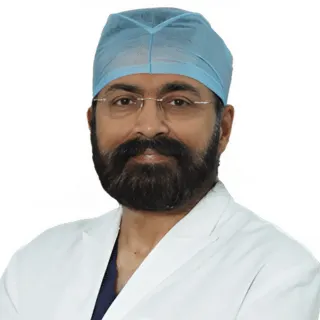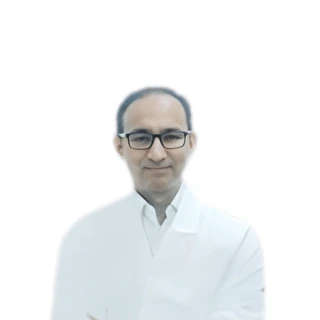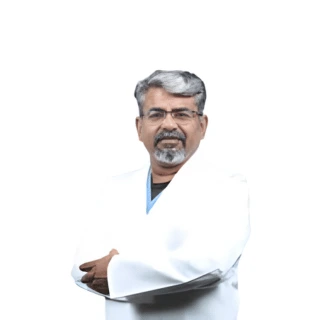Best Orthopedic Surgeons in Artemis Hospital Gurgaon
 17 December,2025
Read More
17 December,2025
Read More
Starting From: USD 60 - USD 180
Hospitalization Days: 1 Days
Procedure Duration: 30 Min - 60 Min
Percutaneous Transhepatic Cholangiogram is affordable in India. The cost of Percutaneous Transhepatic Cholangiogram in India lies between USD 60 - USD 180. The exact procedure price depends on multiple factors such as the surgeon's experience, type of hospital, severity of the condition, patient's general condition,�etc.
Percutaneous transhepatic cholangiogram (PTC) is a diagnostic imaging procedure used to visualize the biliary system. It involves inserting a needle through the skin and into the liver to inject contrast dye directly into the bile ducts. This allows for visualization of the biliary tree and helps diagnose conditions such as bile duct obstruction, stones, or strictures. PTC is typically performed under local anesthesia and fluoroscopic guidance by an interventional radiologist. It provides valuable information to guide treatment decisions, such as the need for biliary stent placement, stone removal, or surgical intervention.
Percutaneous transhepatic cholangiogram (PTC) becomes necessary for diagnostic purposes when there is suspicion of biliary system abnormalities or when conventional imaging modalities such as ultrasound or CT scans fail to provide sufficient information.
There are several types of percutaneous transhepatic cholangiogram (PTC), each tailored to the specific diagnostic or therapeutic needs of the patient:
Patients are selected for percutaneous transhepatic cholangiogram (PTC) based on clinical indications, imaging findings, and the need for diagnostic or therapeutic intervention:
Percutaneous transhepatic cholangiogram (PTC) offers both risks and benefits, which must be carefully considered before undergoing the procedure:
While PTC offers significant benefits in diagnosing and treating biliary disorders, it is important to weigh these benefits against the potential risks and ensure that the procedure is performed by experienced practitioners in a controlled clinical setting.
After a percutaneous transhepatic cholangiogram (PTC), patients can expect a period of recovery and monitoring to ensure optimal healing and detect potential complications.
An interventional radiologist performs a percutaneous transhepatic cholangiogram (PTC) using fluoroscopic guidance and specialized equipment. Here's how the procedure is typically carried out:
PTC is a minimally invasive procedure that provides valuable diagnostic information about the biliary system while minimizing risks and discomfort for the patient.


Chairman
HPB and Liver Transplant Surgeon
Medanta - The Medicity Hospital, Gurgaon

Consultant
Gastroenterologist
Manipal Hospital Formerly Columbia Asia, Palam Vihar, Gurgaon

Consultant
Gastroenterologist, Hepatologist
Manipal Hospital Formerly Columbia Asia, Palam Vihar, Gurgaon
Doctor of Pharmacy
Dr. Deepanshu Siwach is a skilled clinical pharmacist with a Doctor of Pharmacy degree.?He has 4+?years of experience and has worked with thousands of patients. He has been associated with some of the top hospitals, such as Artemis Gurgaon.
Dr. Deepanshu Siwach is a skilled clinical pharmacist with a Doctor of Pharmacy degree.?He has 4+?years of experience and has worked with thousands of patients. He has been associated with some of the top hospitals, such as Artemis Gurgaon....
Director
Hepatologist, HPB and Liver Transplant Surgeon, Surgical Gastroenterologist
Aakash Healthcare Super Speciality Hospital, Dwarka, New Delhi
Dr. Ajitabh Srivastava is one of the best Hepatologists, Surgical Gastroenterologists, and Liver Transplant Surgeons in New Delhi. With over 26 years of experience, he has performed over 2500 liver transplant procedures. He specializes in hepato-pancreato-biliary (HPB) surgery, gastrointestinal surgery, acute liver failure treatment, laparoscopic surgery, and gall bladder surgery....
The duration of a percutaneous transhepatic cholangiogram (PTC) varies depending on factors such as the complexity of the procedure, the patient's anatomy, and any unforeseen challenges encountered during the intervention. Generally, the procedure can take anywhere from 30 minutes to 1 hour to complete.
The success rate of percutaneous transhepatic cholangiogram (PTC) is high. Most procedures successfully visualize the biliary system and identify any abnormalities. Complications are rare, and PTC is an effective and reliable diagnostic tool for evaluating biliary tract disorders.
Patients typically resume normal activities within a day or two after a percutaneous transhepatic cholangiogram (PTC). However, this may vary depending on individual factors and the presence of any post-procedural discomfort. To prevent complications, strenuous activities or heavy lifting may be advised to be avoided for a short period.
A percutaneous transhepatic cholangiogram (PTC) procedure typically lasts about 30 minutes to 1 hour. However, this can vary depending on factors such as the complexity of the case, the patient's anatomy, and any additional interventions or complications encountered during the procedure.
Lifestyle changes may not be necessary for most patients after a percutaneous transhepatic cholangiogram (PTC). However, if underlying biliary issues are identified, dietary modifications such as reducing fat intake or avoiding certain foods may be recommended to alleviate symptoms. Maintaining overall liver health through a balanced diet and regular exercise is also advisable.
Alternative imaging modalities such as magnetic resonance eholangiopancreatography (MRCP) or endoscopic retrograde cholangiopancreatography (ERCP) may be considered for evaluating biliary disorders instead of percutaneous transhepatic cholangiogram (PTC). The choice depends on factors such as patient preference, equipment availability, and healthcare providers' expertise.
The Art of Effective Communication
 17 December,2025
Read More
17 December,2025
Read More
 16 December,2025
Read More
16 December,2025
Read More
 10 December,2025
Read More
10 December,2025
Read More
 09 December,2025
Read More
09 December,2025
Read More
 05 December,2025
Read More
05 December,2025
Read More
 04 December,2025
Read More
04 December,2025
Read More